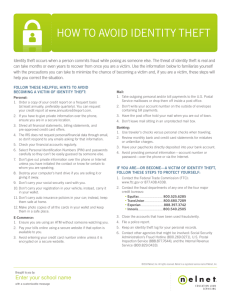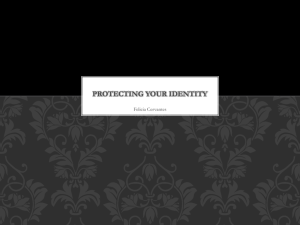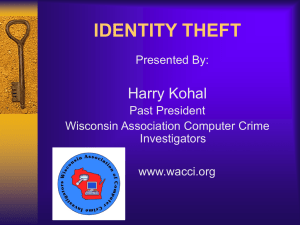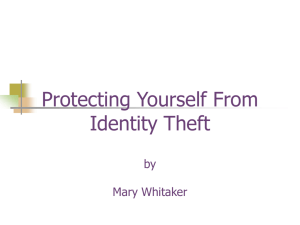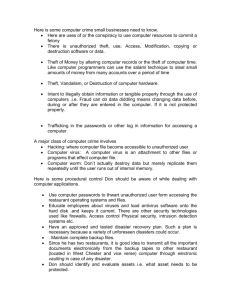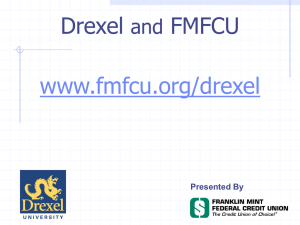Document 11163770
advertisement
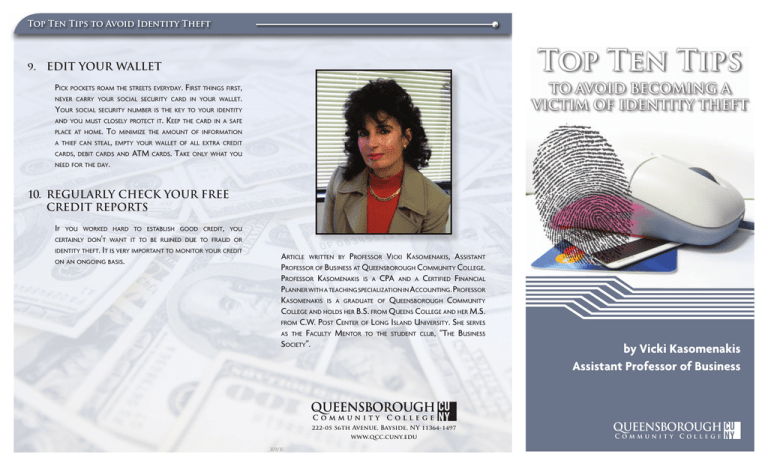
Top Ten Tips to Avoid Identity Theft Top Ten Tips 9. EDIT YOUR WALLET TO AVOID BECOMING A VICTIM OF IDENTITY THEFT Pick pockets roam the streets everyday. First things first, never carry your social security card in your wallet. Your social security number is the key to your identity and you must closely protect it. Keep the card in a safe place at home. To minimize the amount of information a thief can steal, empty your wallet of all extra credit cards, debit cards and ATM cards. Take only what you need for the day. 10. REGULARLY CHECK YOUR FREE CREDIT REPORTS If you worked hard to establish good credit, you certainly don’t want it to be ruined due to fraud or identity theft. It is very important to monitor your credit on an ongoing basis. Article written by Professor Vicki Kasomenakis, Assistant Professor of Business at Queensborough Community College. Professor Kasomenakis is a CPA and a Certified Financial Planner with a teaching specialization in Accounting. Professor Kasomenakis is a graduate of Queensborough Community College and holds her B.S. from Queens College and her M.S. from C.W. Post Center of Long Island University. She serves as the Faculty Mentor to the student club, “The Business Society”. 222-05 56th Avenue, Bayside, NY 11364-1497 www.qcc.cuny.edu 309/10 by Vicki Kasomenakis Assistant Professor of Business Top Ten Tips to Avoid Identity Theft You hear about it on TV. You read about it in the newspaper. You may have heard about it through a friend, relative or a coworker. What is it? IDENTITY THEFT. Identity theft is when someone wrongfully uses your personal information such as your social security number, credit card number, bank account number and drivers license to take out money from your bank account, run up charges on your credit card and take out a loan in your name. Below I have provided a series of helpful tips designed to minimize your risk of becoming a victim of identity theft. Following these tips will not guarantee that you won’t become a victim, but they will certainly help you to reduce the chances of becoming a victim. Top Ten Tips TO AVOID BECOMING A VICTIM OF IDENTITY THEFT 1. SHRED YOUR TRASH do not put outgoing mail, especially bill payments, in curbside mailboxes. Drop off your mail inside a US postal office. prevent hackers from stealing private files and financial Know the approximate billing cycle of all your bills. Follow up with creditors if your bills don’t arrive on time. A missing credit card bill for example could have fallen into the wrong An identity thief may have taken over your credit card account and changed your billing address. Consider converting bill payments as automatic deductions from your checking account. Also use online banking to monitor your bank accounts. 2. GUARD YOUR MAIL Thieves don’t need modern technology to obtain your personal information. They can simply open your unlocked mail box and get your information that is mailed to you such as pre-approved credit cards, bills, government correspondence and much more. Install a locked mailbox at your residence if possible to help deter mail theft. Also, information from your hard drive. In addition, install and regularly update anti-virus protection software in order to prevent any worms or viruses than can corrupt your files. 7. DELETE INFO ON YOUR HARD DRIVE If you decide you want to sell or give away your computer, 4. WATCH OUT FOR SKIMMERS Be mindful when using your credit and debit cards to make purchases at stores and restaurants. Dishonest merchants or employees have been known to secretly copy the magnetic strip on the back of the cards by using a hand held device Do not throw anything away that someone could use to impersonate you. You don’t know who may be looking through your trash. If you’re connected to the Internet, it is very important that you install a firewall on your computer to 3. KNOW YOUR BILLING CYCLE hands. 6. INTERNET SAFEGUARDS called a skimmer to quickly swipe the card. 5. KEEP TABS ON CREDIT & DEBIT CARDS Make containing personal information because technically the file does not go away. a list or photocopy all your credit and debit card this information in a secure place (do not store this information on your computer especially if you are connected to the Internet). There are numerous software applications that can locate and undelete your deleted files. Therefore, to be safe, before you dispose of your computer, remove data on your hard drive by using a strong “wipe” utility program. 8. BE WARY OF SHOULDER SURFERS Be aware of your physical surroundings when you’re using an account numbers with customer service phone numbers. Keep do not only rely on the delete function to remove files ATM machine. Make sure no one is standing right behind you. Someone may be using his or her camera phone to photograph your card number and pin number and use the information to manufacture a fake card to gain access to your bank account. ATM
